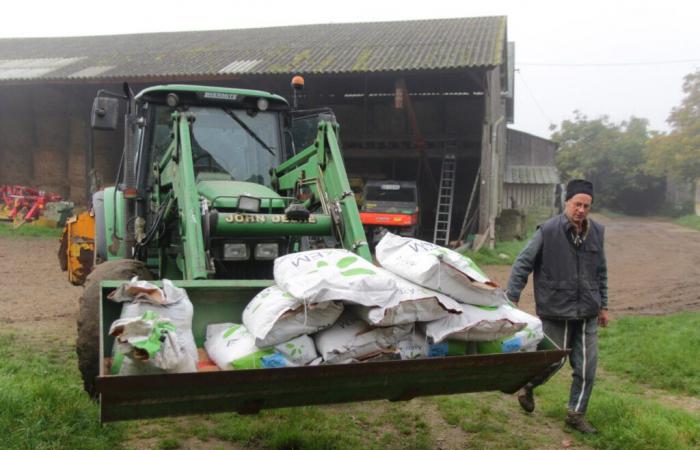Par
Matthieu Van Bellinghen
Published on
Nov 13 2024 at 5:05 p.m
See my news
Follow The Norman Awakening
Everyone is talking about weather report. It's hard not to have noticed that this year had been particularly rainy and fresh. But there is a job where the “weather” is not just a topic of conversation. It is a subject of anger.
Agriculture is suffering from a very difficult year for work. Excess water has consequences on plants. On soil working capacities. But also on diseases of plants and animals.
“Always adapting”
The 2023 harvest was “catastrophic” for Lucie Clouard. She runs a farm a few kilometers from L'Aigle (Orne. The farm has 64 dairy cows, 88 hectares of meadows and a few hectares of cereals and rapeseed.
This year we have been adapting all the time, because it is too humid.
Three diseases to watch closely
And then there are the diseases. There Sheep Catharale Fever (SFF) arrives in Orne. And it also affects cattle.
“Cows affected by FCO have mouth ulcers and, as a result, difficulty eating. » This disease has already been reported on farms in Perche. Other viruses are upon us. There Epizootic Hemorrhagic Disease (EHD) and the tuberculose bovine are present in Sarthe and Norman Switzerland.
450 million liters of milk less!
For the producers of milk, the weather is not clearer. The leading dairy group in Europe, Lactalis, has just announced that it will reduce its milk harvest in France. Each year, by 2030, the French company will reduce milk collection by 450 million liters, or almost 9% of the total.
For its part, the dairy industrialist Savencia, the second largest group cheese maker French, wants to renegotiate its contracts with milk producers.
Mercosur, the decline in quality
Yes, 2024 is definitely a dark year. The future could become even darker with the signing of the free trade agreement between the European Union and the countries of Mercosur« , Argentina, Brazil, Bolivia Uruguay and Paraguay.
These countriesSouth America have very different types of agriculture from ours. Fewer health standards, fewer environmental rules to respect. Their production costs are significantly lower than in Europe. Farmers fear the arrival of these products on the European market. They will bring “a decline in health quality, and a price which will distort competition. »
Pour Lucie Clouard “This free trade agreement is a disaster. » It will weigh heavily on the competitiveness of production in France. “The profession of farmer is less secure than before. » The young woman gets by by selling part of her production in the short circuit.
In particular, she makes bread on the farm. According to her, “we need to change practices to change the agricultural model”. But to be able to make the investments she would like for her farm, “you would need remunerative prices and a long-term vision. »
“Tensions are everywhere”
Pour Marc Gégu“tensions are everywhere”. This cereal grower, administrator of the FDSEA, is worried. He fears the arrival of meat from South America. » We have doubts about the quality and the prices. We expect to see products 30% cheaper at retailers.” THE imports South American countries could call into question the efforts made by French farmers.
Farmers are asked to make efforts to produce healthily, with strict rules on the use of pesticides. Why would we allow these products on imported foods?
Dissolution blocked reforms
But he also has another cause for concern. The cessation of the immense construction site reforms since last winter's farmers' crisis. An agricultural orientation law was passed by the deputies on May 28, 2024. This text concerned the simplification administrative and the remuneration farmers. It was to be examined by the Senate. But the dissolution blocked the process. THE legislative work will have to start again.
A deadline is approaching
But when? For Marc Gégu“The law that was to be passed was interesting. It concerned the remuneration of producers and administrative simplification. »
A critical area for water quality
“The Orne is a water tower”. Marc Gégu explains that the farmers around L'Aigle are particularly monitored. “With the sources of Risle, Iton de l'Orne but also Sarthe which are located within a 20km radius, the use of pesticides is very controlled in the sector. It is essential not to pollute these very important rivers in the region.
Weather, economic constraints, competition, pending regulations. Clouds are gathering over the profession. In Orne, farmers have not yet spoken out for a mobilisation of protest, even if at the national level actions are already in the pipeline, probably from next Monday.
But a deadline is approaching. The agreement EU-Mercorsur could be signed on November 18 and 19 during the G20 meeting in Rio de Janeiro (Brazil).
Follow all the news from your favorite cities and media by subscribing to Mon Actu.






